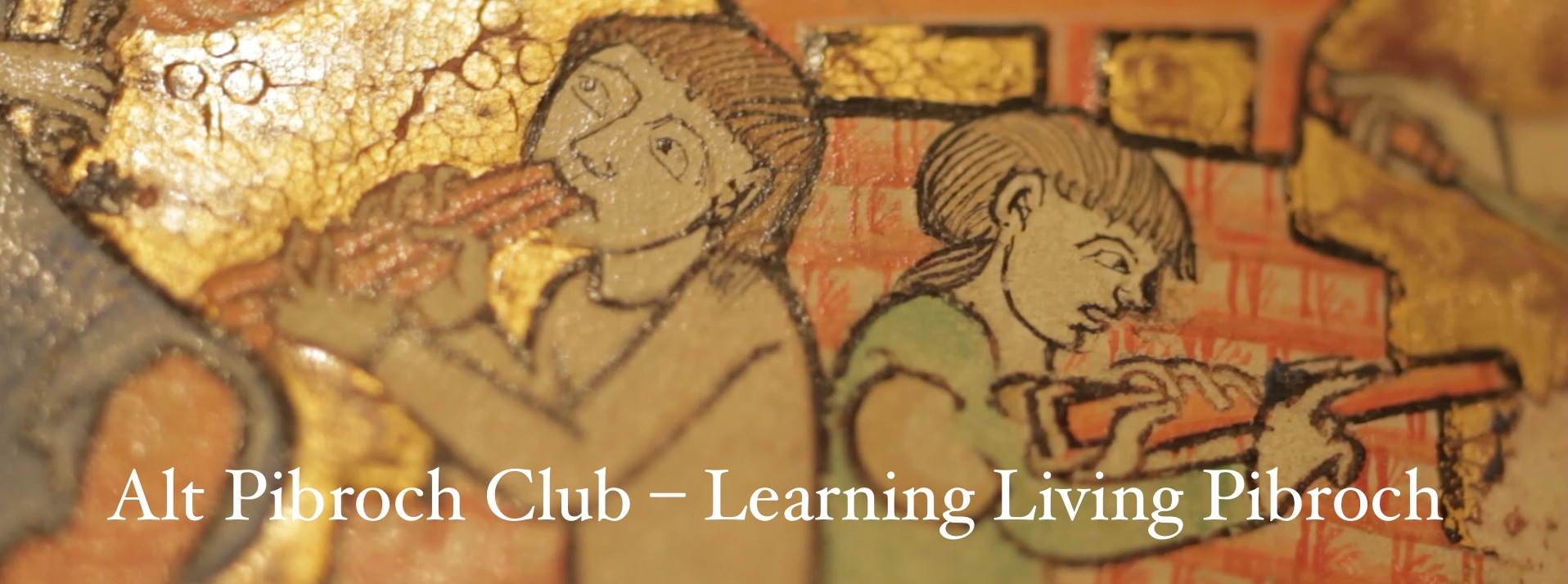Held in the Great Hall of Stirling Castle, five years after winning his two Clasps (1989 and 1990).
The lecture follows on the heels of his University of Edinburgh thesis, The Relationship between Pibroch and Gaelic Song: its Implications on the Performance Style of the Pibroch Urlar. It includes performances by Anne Lorne Gillies, Allan MacColl and Gordon Duncan.
Part One:
Part Two:
In the booklet for Allan’s CD, Dastirum (2007), Bill Livingstone wrote:
Several years ago, my wife Lily and I were driving to the Highland Games at Fort Erie, in Ontario, Canada. The road takes one through the heart of Niagara wine country, so we had planned to find a shady spot in some vineyard for a picnic lunch. But it began to rain. Then to pour. We did park in the middle of a vineyard, but we had to enjoy our picnic and the chardonnay in the car.
A friend had given me tapes of Allan, interviewed on Radio Scotland by Iain MacInnes. It was a wonderful, near-mystical experience. The rain pounded the roof, the car closed in with the heat and steam, and Allan took us on a journey… playing, singing and talking. He told us about the ancient keening tradition, and the original, functional nature of much of pibroch music. He sang the Gaelic songs which underlie the melodies of so many tunes, and laid out his intuition about the complex rhythms which were surely imported into our music from the Gaelic language.
I was pinned to the seat. I heard things that I had never imagined before. Lily, who has been listening to this music for 35 years, but in our modern performance style only, was equally enchanted. It was an exquisite and romantic moment. But from a more mundane point of view, it was a musical epiphany.
Allan has shown, to me at least, that the old manuscripts, and Gaelic language and song, hold the key to a beautiful way of performing this music. I recently shared a stage with him where I demonstrated the modern performance style, and Allan then took us back in time, suggesting how the same tune might have been played 300 years ago. I found the difference exhilarating, of greatest interest. So too did the non pibroch-playing audience.
Some people are strongly attached to the modern tradition, and find Allan’s revolutionary approach unsettling. But no one can doubt that we are listening to a consummate musician, playing with passion and mastery of his art. His integrity and intelligence in a hostile field is something to be treasured.

Simply stunning.
Dr MacDonald’s lecture demonstrates the utter incompetence of the Piobaireachd Society’s Music Committee and the piobaireachd judging bench, as well as the foolishness of the members.
Resignations please!
So,
please recall that this was years ago, that the PS and its music committee have changed membership and outlook considerably since, and that Allan is doing well enough as a composer and professional performer in his own right.
Change has come (wait to see the forthcoming set lists) and will continue.
Visit Rab Wallace’s site and tell me what you think afterwards.
David,
I read the page you hyperlinked. Yes, change is happening but at glacial speed!
I noted that some of the members found it hard to come to terms with the ideas in your lecture. Sad.
The most important point of the above two recordings in my opinion is the need to find the Gaelic song behind the piobaireachd.
‘The Carle with the Breeks’ is a tune I have looked at often and could never understand or make sense of until now. As of yesterday, it’s been added to my repertoire! Donald MacDonald’s setting seems closest to what was sung - subject to judicious use of his cadences of course.
My current tune list:
The Pretty Dirk (MacPhee 1:27)
The Sword’s Lament (MacDonald 71)
Welcome Johnny Back Again (PS 258)
The Stuart’s White Banner (PS Series 1)
Lament for Donald Duaghal MacKay (PS 431)
The Bard’s Lament
Lady Margaret MacDonald’s Salute (MacArthur)
The Rout of the Lowland Captain (PS 260)
The Piper’s Lamentation in the Stocks (PS Vol.1)
Taoitear Chloinn Raghnaill (PS 466)
The MacDonalds are Simple (PS 256)
Lament for the Great Supper (PS 572)
The Fairy Glen (PS Vol. 1)
The Red Speckled Army (PS 105)
Lament for the Departure of King James (MacPhee 2:4)
General MacKenzie Fairburn’s Lament (PS 1)
The Gordan’s Salute (MacPhee 2:3)
Salute to the Old Sword (PS 371)
Sir Ewen Cameron of Lochiel’s Salute (PS 284)
The Earl of Seaforth’s Salute (MacPhee 1:25)
Salute to the Chief of Menzies (PS 531)
The Rout of Glen Fruin (MacDonald 48)
Catherine’s Salute (Ross 64)
A Ghlas Mheur (Glen 60)
MacNeill is Tighearna Ann (PS 346)
All the Men paid Rent, but Rory (PS 348)
The Rout of Bendoeg (PS 355)
War or Peace (PS 305)
The Inverness Piobaireachd (Ross 44)
Fair Honey (PS 262)
Too Long in this Condition (MacPhee 1:20)
The Battle of Castle Strone (Ross 79)
Lament for the Harp Tree (PS 362)
Hector MacLean’s Warning (MacArthur 134)
Ewen of the Battles (PS 388)
Bodaich nam Briogais (MacDonald 102)
Note that tunes such as The Piper’s Lamentation in the Stocks (PS Vol.1) is NOT ‘The Unjust Incarceration’ as set by the Piob. Society, but John Smith manuscript setting which I have pasted into the Piobaireachd Society book for easy reference.